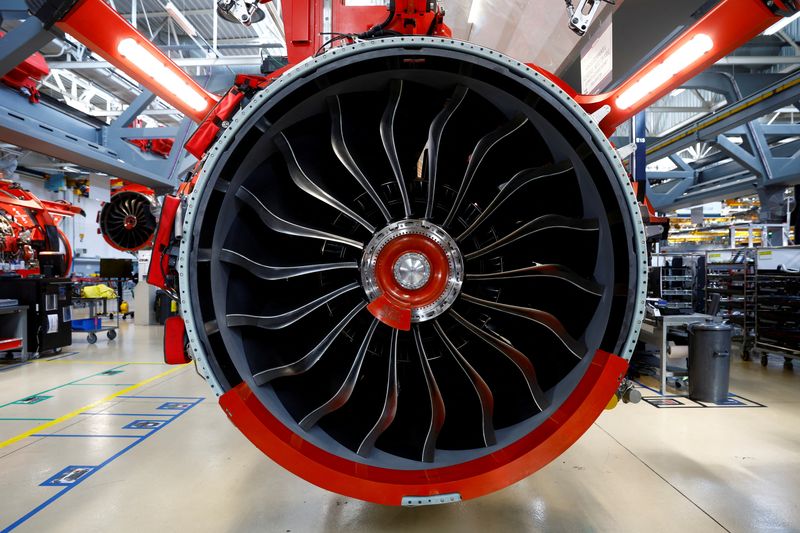By Tim Hepher
PARIS (Reuters) -Engine maker CFM's wariness to ramp up supplies significantly to Airbus at a time of stress for its other key customer Boeing (NYSE:BA) was likely one factor in Airbus' move to delay planned jet output increases, industry sources said on Tuesday.
On Monday, Airbus delayed a multi-year hike in narrowbody production, cut profit forecasts and trimmed its 2024 delivery target, blaming shortages of engines and other parts and sending shares in Europe's largest aerospace group tumbling on Tuesday.
CFM, a transatlantic venture of GE Aerospace and France's Safran (EPA:SAF), makes LEAP engines that power all Boeing 737 MAX jets and typically just over half of the competing Airbus A320neo family, where they compete with the Geared Turbofan of RTX subsidiary Pratt & Whitney.
Airbus is racing to increase production to meet demand in the face of scepticism by many suppliers over its output plans.
Negotiations to secure the necessary number of engines for 2025 to keep the previous targets on track hit a snag after Airbus asked CFM to increase its share of narrowbody deliveries to compensate for industrial woes at Pratt, the sources said.
Airbus was hoping CFM would hike its share of Airbus production to the equivalent of around 75% of A320neo deliveries from about 60% now, two people familiar with the matter said.
That raised industrial questions after CFM engine deliveries had already fallen in the current quarter, following a flat performance in the previous three months, industry sources said. Airbus has also highlighted other shortages including cabins.
But Airbus's request also put the world's largest engine maker in an increasingly delicate strategic position ahead of its 50th anniversary, as it threatened to worsen severe headaches at its other major customer, Boeing.
CFM's market share depends on a triangle of factors: Airbus's production rate, Boeing's production rate and the contribution of CFM's rival Pratt & Whitney to Airbus output.
Before the pandemic, these were roughly in equilibrium, though CFM's share of the Airbus deliveries was drifting steadily higher amid industrial problems at its rival.
Now, the industry faces not one but two ongoing crises - an in-flight blowout that slowed Boeing's recovery from earlier safety woes and chronic bottlenecks at Pratt and Whitney. And the sheer scale of disruption to the usual balance of power between top players has put CFM under pressure to produce more.
By contrast, Airbus is racing to meet demand. With Boeing still lingering at low rates, that heralded a crushing lead for its European rival if CFM could give it all the engines it needed.
"CFM will try to accommodate both sides but ultimately it will never do anything that structurally disadvantages Boeing," its first and largest partner, a senior industry source said.
Another person familiar with the engine maker said its reluctance to harm Boeing unduly may not be articulated directly with Airbus, but weighed in internal discussions.
"CFM will try to put the brakes on Airbus for sure," the person said.
A spokesperson for CFM said: "The supply chain environment remains challenging and we are working to meet LEAP engine demand from all our customers". It has also repeatedly said it favours neither Boeing nor Airbus.
Airbus said it doesn't comment on confidential discussions with suppliers.
CFM makes up 65% of Airbus's A320neo-family order backlog in cases where airlines have made an engine choice and accounted for 50% of Airbus narrowbody deliveries in 2023, according to Rob Morris, global head of consultancy at Cirium Ascend.
STAUNCH SUPPORT
Founded in 1974, CFM was the brainchild of industrialists with colourful war records: a German-born fighter engineer who fought for the allies, Gerhard Neumann, and French resistance hero Rene Ravaud, who lost an arm in British bombing of Brest.
Little known to the public, it sailed unnoticed through the industry's biggest battles including a trade war between its clients Airbus and Boeing and stormy transatlantic trade ties.
Safran's chairman pointedly reminded an audience including French Finance Minister Bruno Le Maire and senior Boeing executives of the importance of Boeing to CFM and French aerospace in an anniversary ceremony in early June.
Speaking in the gilded state rooms of France's former naval ministry, Ross McInnes said: "We have stood staunchly behind Airbus and Boeing through both their respective ups and downs, and indeed the ups and downs of transatlantic relations. The success story would not have been possible otherwise."
Top Airbus officials did not attend the event which coincided with management talks at the Berlin Airshow.
On Tuesday, with Airbus shares down 11% on the production delays and a surprise charge at its Space business, another executive summit was under way at its Toulouse headquarters in a sombre atmosphere, insiders said.
CFM must agree engine volumes about 18 months ahead, so mid-2024 was looming as a pressing deadline for clarity on 2025.
On Monday, Airbus CEO Guillaume Faury acknowledged that 2025 had not been set in stone but sought to limit ramp-up concerns.

"When it comes to the 2025 volumes, we have what we need in terms of commitment from the engine makers," he told analysts.
"It doesn't mean that we are fully in agreement for the final volumes that we will retain but we have what we need to be supported for their ramp-up in '25. That's what matters to me."